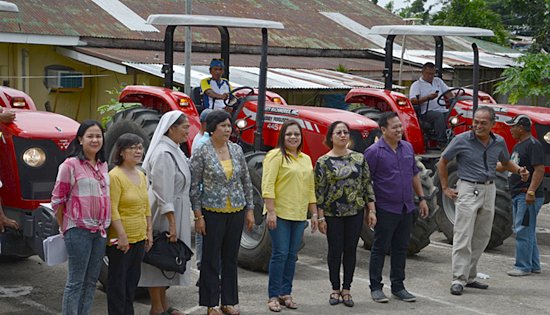|

Regional
Director Sheila Enciso (center) of the Dept. of Agrarian Reform
(DAR) in Region-8 posed with Sister Eloisa David, OSB (third
from left) and other DAR officials in front of the five tractors
that were turned over to recipient agrarian reform beneficiary
organizations (ARBOs) under the Agrarian Reform Communities
Connectivity and Economic Support Services (ARCCESS) project
after the ceremony. (JOSE ALSMITH L. SORIA) |
DAR turns over
P15.5-M machineries
By JOSE ALSMITH L. SORIA
September 16, 2014
TACLOBAN CITY – Some
P15.5 million worth of farm machineries were turned over recently by
the Department of Agrarian Reform (DAR) to five agrarian reform
beneficiary organizations (ARBOs) in Leyte, Samar and Eastern Samar.
The amount, according to
Regional Director Sheila Enciso, is the total cost of the five
tractors given away to ARBOs in severely affected provinces by the
super typhoon “Yolanda”.
Enciso added that the
machines were primarily intended for the clearing and rehabilitation
of farm lots in areas greatly affected by the typhoon.
Based on available data,
Leyte, Eastern Samar and Samar were the hardest hit provinces with
thousands of people reported dead, while millions of pesos worth of
properties were damaged. Thus, three tractors were distributed in
Leyte, while one tractor each for the provinces of Samar and Eastern
Samar.
DAR entrusted to five ARBOs
the operations and maintenance of the machines which cost P3,117,920
per unit.
For Leyte, DAR turned over
the machines to the St. Benedict’s Association for Sustainable Farming
which is based in Tunga, the Boroc Agricultural Primary Multi-Purpose
Cooperative in Ormoc and the Zaragosa Agrarian Cooperative in Matalom;
while for Eastern Samar and Samar, DAR turned over the machines to the
Carapdapan Small Farmers and Fishermen Producers Cooperative based in
Salcedo, Eastern Samar and the Legaspi Farmers and Fishermen
Association in Marabut, Samar, respectively.
These tractors were funded
under the Agrarian Reform Communities Connectivity and Economic
Support Services (ARCCESS) project.
Though these were not among
the recommended common service facilities (CSFs) for the ARCCESS
project, Enciso explained that these were provided by the agency in
addition for the typhoon-affected areas to help out clear the farms
from debris and restore them back to their productive state.
It was also very timely, she
added, because during the agency’s last meeting with representatives
from the Catholic Relief Services (CRS) and the Food and Agriculture
Organization (FAO), who both renewed their commitment to assist in the
rehabilitation of the ARCs, DAR was asked to provide the tractor to
hasten the restoration process.